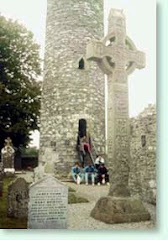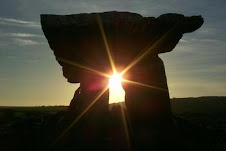
IRISH LEGEND
Oisin And Tir Na Nog
Oisin loved poetry, music and song. When he was twenty years old, he was the best-loved poet in Ireland. People came from every province just to hear him read and sing.
One day, a beautiful young maiden came to hear his poems. She had bright blue eyes and long golden hair. Her skin was as clear and fresh as a rose petal.
Her dress was made of the finest silk. Her cloak was embroidered with emeralds and jewels. She wore silver shoes with golden buckles. She rode the finest white horse that was ever seen in Ireland.
Her name was Princess Niamh. She had travelled very far from the land of Tir Na Nog,a magical land far out beyond the western sea. In this land, no one ever grew old. It was a land where the sun never set and the rain never fell. Tir na nog was the land of eternal happiness.
Day after day, Niamh listened to Oisin’s poems and songs. Soon, she fell in love with him. Oisin fell in love with Niamh, and they were both very happy.
Soon the time came for Niamh to return to Tir na nog. She begged Oisin to go with her to Tir na nog. She told him he would never grow old and that he would be happy forever.
Because he loved Niamh so dearly, Oisin agreed to go with her to Tir na nog.
There was much sadness when the people of Ireland waved goodbye to Oisin and Niamh.
Before long, the great white horse was carrying them off to the west.
With just a few galloping strides, they reached the coast at Connemara. Then the horse galloped over the tops of the waves and off out to sea.
When Oisin looked back, Ireland had disappeared below the horizon. In no time at all, they reached the magical land of Tir na nog.
The King and Queen of Tir na nog welcomed Oisin to his new home.
They had heard much about Oisin and his poetry. They were happy to have him as their son-in-law.
The next day, Niamh and Oisin were married.
The wedding feast was the finest evere seen. Everyone in Tir na nog was invited.
Just as in Ireland, everyone in Tir na nog loved Oisin.Both he and Niamh were very happy.
When one year had gone by, Oisin wanted to visit Ireland one more time. He wanted to see his father, who was Finn mac Cumhall. One day, Oisin told Niamh of his plan.
She was very deeply troubled. She feared Oisin might never return from Ireland.
When Oisin promised he would return, Niamh agreed to let him go.
“Be very careful”, warned Niamh, “and do not touch the ground in Ireland. If you do, you will never again return to Tir na nog”. When it was time for Oisin to go, Niamh warned him again.
“Do not dismount from the great white horse. He will bring you back safely to Tir na nog”. Niamh was very sad as she waved goodbye to Oisin.
Before long, Oisin and the great white horse were on their way back to Ireland. Once more, they galloped over the tops of the waves. Soon the coast of Connemare came into view. When they reached Ireland, Oisin could not recognise the land.
Everything had changed. The great plains where Oisin and Finn and the Fianna had roamed were gone. The great Fianna fortresses were in ruins. They were overgrown with briars and brambles. The people’s dress had changed. Oisin asked about Finn and the Fianna. “They have been dead for hundreds of years,” the people told him.
Then Oisin understood what had happened. One day in Tir na nog was the same as a year in Ireland. Oisin had been away for more than three hundred years.
Sadly, he turned back for Tir na nog. On the way, he met some men struggling to move a heavy stone. The men asked Oisin to help. Oisin did not refuse. He reached down from his saddle and picked up the stone with one hand. The men were astonished at Oisin’s great strength. Suddenly, the saddle girth snapped. Oisin fell from the horse.
The moment Oisin touched the ground, he changed. He was no longer a handsome young prince. Instead, he had turned into a withered old man. The great white horse took fright. It galloped back to Tir na nog and was never seen in Ireland again.
The literal translation of Tir na nOg
(from Irish Gaelic) is "Land of the Young",
and is used to refer to the afterlife.
Oisin And Tir Na Nog
Oisin loved poetry, music and song. When he was twenty years old, he was the best-loved poet in Ireland. People came from every province just to hear him read and sing.
One day, a beautiful young maiden came to hear his poems. She had bright blue eyes and long golden hair. Her skin was as clear and fresh as a rose petal.
Her dress was made of the finest silk. Her cloak was embroidered with emeralds and jewels. She wore silver shoes with golden buckles. She rode the finest white horse that was ever seen in Ireland.
Her name was Princess Niamh. She had travelled very far from the land of Tir Na Nog,a magical land far out beyond the western sea. In this land, no one ever grew old. It was a land where the sun never set and the rain never fell. Tir na nog was the land of eternal happiness.
Day after day, Niamh listened to Oisin’s poems and songs. Soon, she fell in love with him. Oisin fell in love with Niamh, and they were both very happy.
Soon the time came for Niamh to return to Tir na nog. She begged Oisin to go with her to Tir na nog. She told him he would never grow old and that he would be happy forever.
Because he loved Niamh so dearly, Oisin agreed to go with her to Tir na nog.
There was much sadness when the people of Ireland waved goodbye to Oisin and Niamh.
Before long, the great white horse was carrying them off to the west.
With just a few galloping strides, they reached the coast at Connemara. Then the horse galloped over the tops of the waves and off out to sea.
When Oisin looked back, Ireland had disappeared below the horizon. In no time at all, they reached the magical land of Tir na nog.
The King and Queen of Tir na nog welcomed Oisin to his new home.
They had heard much about Oisin and his poetry. They were happy to have him as their son-in-law.
The next day, Niamh and Oisin were married.
The wedding feast was the finest evere seen. Everyone in Tir na nog was invited.
Just as in Ireland, everyone in Tir na nog loved Oisin.Both he and Niamh were very happy.
When one year had gone by, Oisin wanted to visit Ireland one more time. He wanted to see his father, who was Finn mac Cumhall. One day, Oisin told Niamh of his plan.
She was very deeply troubled. She feared Oisin might never return from Ireland.
When Oisin promised he would return, Niamh agreed to let him go.
“Be very careful”, warned Niamh, “and do not touch the ground in Ireland. If you do, you will never again return to Tir na nog”. When it was time for Oisin to go, Niamh warned him again.
“Do not dismount from the great white horse. He will bring you back safely to Tir na nog”. Niamh was very sad as she waved goodbye to Oisin.
Before long, Oisin and the great white horse were on their way back to Ireland. Once more, they galloped over the tops of the waves. Soon the coast of Connemare came into view. When they reached Ireland, Oisin could not recognise the land.
Everything had changed. The great plains where Oisin and Finn and the Fianna had roamed were gone. The great Fianna fortresses were in ruins. They were overgrown with briars and brambles. The people’s dress had changed. Oisin asked about Finn and the Fianna. “They have been dead for hundreds of years,” the people told him.
Then Oisin understood what had happened. One day in Tir na nog was the same as a year in Ireland. Oisin had been away for more than three hundred years.
Sadly, he turned back for Tir na nog. On the way, he met some men struggling to move a heavy stone. The men asked Oisin to help. Oisin did not refuse. He reached down from his saddle and picked up the stone with one hand. The men were astonished at Oisin’s great strength. Suddenly, the saddle girth snapped. Oisin fell from the horse.
The moment Oisin touched the ground, he changed. He was no longer a handsome young prince. Instead, he had turned into a withered old man. The great white horse took fright. It galloped back to Tir na nog and was never seen in Ireland again.
The literal translation of Tir na nOg
(from Irish Gaelic) is "Land of the Young",
and is used to refer to the afterlife.





Nessun commento:
Posta un commento